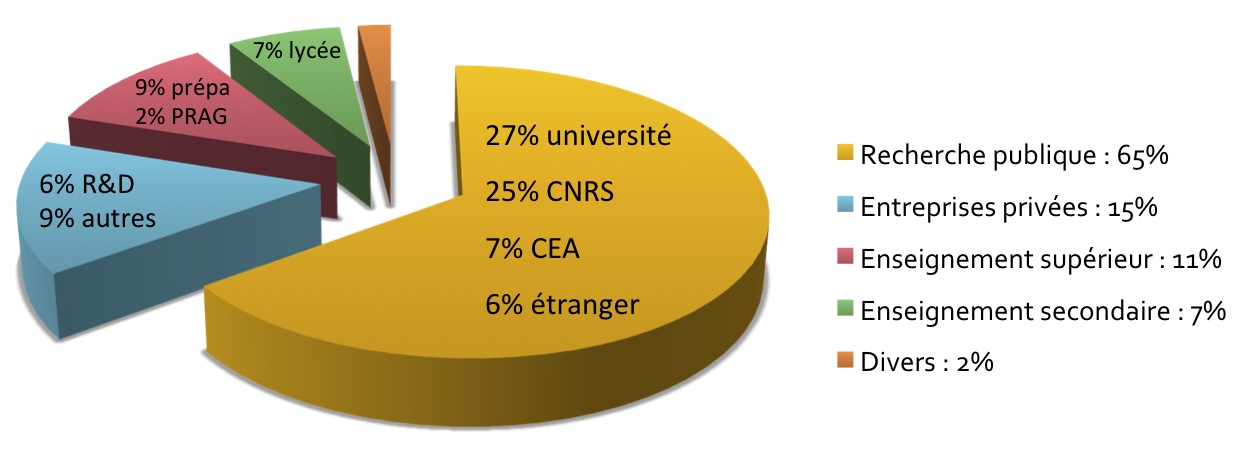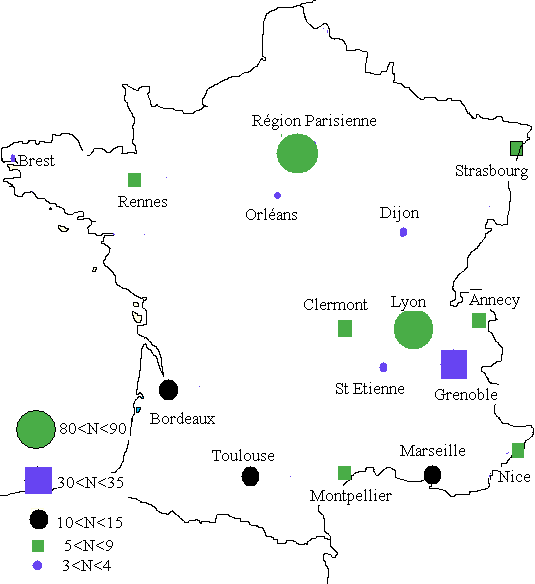In the tradition of France's Écoles Normales Supérieures, this programme offers non-specialized training in the combined disciplines of physics and chemistry, as well as where these two disciplines overlap with other disciplines, such as biology and computer science.
Physics and chemistry are both experimental sciences. Emphasis is therefore placed on practical coursework and research internships in a laboratory.
This training programme also allows students to acquire top-quality theoretical knowledge and a mastery of the most recent digital tools and methods.
Via training by and for research, Physics & Chemistry students become polyvalent researchers capable of adapting to numerous subjects and innovating in a wide variety of work environments.
A few figures:
- around 60 students per year in the Licence 3, in the Master 1 and in the Master 2;
- over 200 teachers involved in the Master's programme;
- 2 participating institutions (ENS de Lyon, UCBL);
- 3 double diploma (EPFL, Politecnico di Milano, Centrale Lyon)
- 5 partnerships at the Master's level (Mines-ParisTech, Ecole des Ponts, ENSTA, ENSAE, Mines de Saint Étienne).
Research and innovation are at the heart of our Physics & Chemistry programme.
The main objective of our Physics & Chemistry training programme is to guide students towards preparing a thesis. To this end, all programme instructors are also researchers active in international competition.
Throughout their training, students attend numerous seminars, which offer them the opportunity to discover subjects on the cutting edge of research and to observe how well-known researchers communicate their discoveries.
Training relies on the laboratories of ENS de Lyon and of Université Claude Bernard Lyon 1. Some practical coursework is carried out at these laboratories, offering students a general overview of Lyon-based research.
Each year is rounded off with a research internship at a laboratory in France or abroad, which allows the student to experience working within a team and to discover the world of academic or industrial research.
The Physics & Chemistry programme provides training for all academic and industrial research professions, as well as careers in higher education.
he vast majority of our Physics & Chemistry programme graduates continue their studies by pursuing a doctoral thesis funded by an academic or industrial contract.
Following the first year of their Master's, students can also prepare for the French agrégation competitive examination thanks to the "Teaching Professions" Master 2 programme at ENS Lyon. For more information, visit the websites for preparing for the Physics and Chemistry agrégation exams.
The research intership at the end of the second year of the Master's generally constitutes a prelude to pursuing a thesis at the same laboratory. Almost all Physics & Chemistry degree holders obtain a permanent job in research or higher education following their thesis and a post-doctoral stay in France or abroad.
Types of jobs
The following chart presents the distribution of the various permanent jobs found by former Physics & Chemistry students having obtained a thesis (statistics for the Physics Major since 1988).

Job sectors
This programme prepares students for all of today's rapidly developing job sectors in Physics and Chemistry, via diverse coursework covering the most fundamental as well as the most hands-on subjects, digital modelling, and the connections between physics, chemistry and other scientific disciplines, such as biology or even economics and the social sciences.
The diversity of research internships successfully carried out at every level of the programme (Licence 3, Master 1 and Master 2) testifies to this thematic richness. One should also note opportunities to pursue top-level careers occasionally lying outside the programme's two major disciplines, notably thanks to competitive exams for integrating government agencies and the implementation of partnerships with French and European engineering schools, such as Ecole Centrale de Lyon, Politecnico Di Milano or EPFL.
This great thematic diversity of job opportunities is made possible by the specific high standards of the broad-based education provided by the Écoles Normales Supérieures: far from simply skimming over problems, ENS training requires students to pursue a deep understanding of their discipline, thereby allowing for a solid, constructive approach, to innovate at the crossroads of theory, measurement and modelling.
Job locations
The Physics & Chemistry programme strongly favours dispersal. 15% of graduates find employment outside France following their thesis. The following map indicates the geographic distribution of permanent jobs obtained in France (statistics for the Physics Major since 1988).


